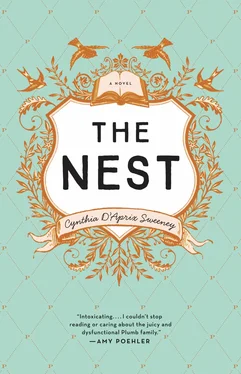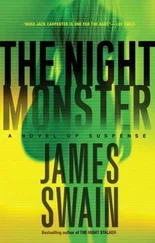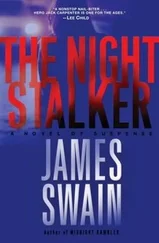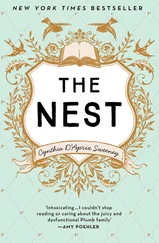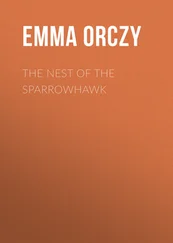“I didn’t steal this, you motherfucking asshole,” Tommy said; his face was so close that Jack could see the small spread of whiskers at the top of Tommy’s cheekbone that he’d missed that morning while shaving. Tommy spoke and spit a little in Jack’s face with each word: “This was a gift from my wife.”
Jack was surprised to find lurking somewhere in his memory the trick they were taught back when he was with ACT UP and they were constantly being hassled and arrested by the police. To just relax, not fight. He held Tommy’s gaze, maintaining a neutral face. Tommy’s face fell and his whole body sagged as he stepped away from Jack.
“Jesus Christ,” he said, and the words barely came out. He sat back down and looked at his hands as if they weren’t his own. “What’s wrong with me?” He turned to Jack. “It was a gift,” he said, as he put his head in his hands and started sobbing. “It was a gift from my wife.”
JACK FOUND HIMSELFin the peculiar situation of making tea for Tommy. He rummaged through the cupboards, a sad collection of items he imagined Tommy bought (Cap’n Crunch, Ramen, boxed mac and cheese) and things someone else had clearly delivered (organic canned chili, packaged quinoa, chamomile tea), and got him to sit at the kitchen table. Tommy spilled the story with little urging and Jack found himself feeling oddly sympathetic. Poor bastard. He would have to proceed delicately.
Jack made his proposal, poured more tea, opened a stale pack of vanilla wafers, and waited for Tommy to respond.
“I don’t know,” Tommy said. He was staring at the closed cabinet door, behind which the statue lived. “I don’t know.”
“You can trust me,” Jack said. “I won’t make a move until you tell me you’re ready. You know if anyone finds out—”
“I know. Believe me, I have nightmares about dropping dead and my daughters having to deal with this.”
“If you want to keep it, I get it.” And Jack did get it. He understood the need for talismans from the dead. He and Walker had lost dozens of friends, had been pulled aside multiple times by a grieving mother or sister or cousin who offered a remembrance of the deceased to take home, like a party gift. Please, a friend’s stepsister had pleaded once, my parents will just drive it all to Goodwill; please take something that will remind you of him . And they did. Multiple things. Michael’s lime-green pocket square, Andrew’s aviator sunglasses, the tiny bistro chairs David used to make from discarded champagne-cork cages, countless framed photos and out-of-order watches and the odd tie or belt. Jack kept everything neatly folded and arranged on one shelf of a bedroom bookcase. The Museum of Death, Walker would grimly joke, but he cherished the tokens, too. All the remembering. The shelf held nothing of value and it held everything of value. It was the past they’d both endured and escaped. It was despair and hope. It was life and death.
“I understand if you want to keep it,” Jack said. “But I also understand”—and here he scooted his chair a little closer and put his hand on Tommy’s and his concern was unfeigned—“I also understand if you need to get rid of it. And I can help you.”
Leo had never been an early riser, but since he’d been living at Stephanie’s the early morning hours had returned to his day, the hours he used to spend fighting consciousness, not wanting to feel the radiating burn of Victoria’s fury from the other side of the bed, not ready for the muddled, self-recriminatory walk to the bathroom for water to soothe his parched, funky mouth, or the inglorious rattle of Advil tumbling into his trembling palm. Those days, there wasn’t a single morning he didn’t wake and swear the day ahead would be different. And not a single day where he didn’t break his promise to himself, usually by midafternoon, gradually denuded by a day of boredom, by the specter of the evening in the company of his bitter, hostile wife.
But these days, he woke as the morning light slowly shifted the sky from black to the watery blue of winter. He’d quietly leave the bed and head to the bathroom, keeping his step light along the warped hardwood floors and stairs that creaked beneath the tiniest bit of pressure. He’d retrieve the New York Times from the front stoop and head into the kitchen to boil water for coffee. Stephanie had the same French press she’d owned when they met, when everyone else he knew thought coffee came brewed from the local deli or a street vendor. Once he’d poured the boiling water over the grounds, he’d sit at the kitchen table and slowly page through the paper, waiting to hear a thump in the pipes, hot water making its way up from the basement, signaling Stephanie was up and had turned on the shower. Around the time he was done with the world and national news, he’d hear the shower turn off with a healthy screech. He’d plunge the center filter on the French press and pour himself a cup.
And it was at that exact moment on the day after meeting with Nathan, sitting in Stephanie’s kitchen, watching a fat slice of sun creep across the marble countertop and magnify every discoloration and imperfection, mulling the day ahead, that he started to feel the familiar darkness gathering inside, the glint of fear around its edges. It reminded him of that children’s book Melody had loved as a little girl, the one he’d read to her over and over when his parents demanded he babysit, about a French girl with a straw hat and the towering woman — he’d never understood who she was, a teacher? A nun? A nurse? — who had a second sense for trouble. “Something is not right,” she would say, abruptly waking in the middle of the night. No shit, Leo thought.
Leo hadn’t really trusted this new world order — the pretty house in Brooklyn, the comely redhead moving around upstairs, his triumphant return at Nathan’s side. He’d regarded the whole picture warily, like it was an opalescent shell found on the beach that was concealing something unsavory inside — the stink of seaweed, a putrefying mollusk, or, worse, something still alive, its pincers stirred and groping for a tender bit of flesh.
Decisions needed to be made. Deadlines were approaching. He was thinking about who he could send his proposal to; he knew it was worth something. If he wanted to stay, he was going to have to figure out what to do about the money he owed The Nest. If he wanted to stay.
Many days, he’d considered paying off his siblings because it could be nice, the grand gesture, the rescuing hero. But this is what he kept coming back to: What if he needed that money someday? What if he needed an escape hatch? He’d always had one. Thinking about not having one almost made him dizzy. He kept trying decisions on like jackets: stay, go, pay everyone off . In the past, he’d always been able to thrive in this place, the familiar sweet spot of avoidance, keeping a million plates spinning until they all gradually fell and he quickly moved along to something shinier, but this felt different.
Stephanie. He could hear her coming down the stairs now, ready for work, boots pounding the steps hard and fast, too fast; he always braced a little, expected to hear her slip and fall and tumble, but she never did. He’d downplayed the meeting with Nathan, said they’d spent “too much time catching up” and were going to meet again. He would present a milder version of what had happened once he had someone else interested. “Slow down,” he said as Stephanie rounded the corner into the kitchen. “You’re going to kill yourself on those stairs.”
She grinned at him and grabbed a banana from a bowl on the counter. “Already moving too fast for you, Leo?” She peeled the banana, poured milk in her coffee.
Читать дальше
Конец ознакомительного отрывка
Купить книгу
